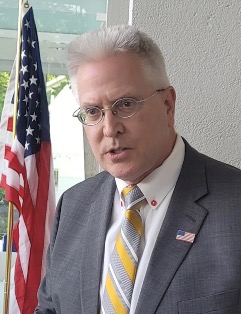Will Christmas come early for the emerging Big Pharma/Biotech industrial complex? Not if enough of us have anything to say about it! Action Alert!
Listen to the audio version of this article:
THE TOPLINE
- Pharmaceutical companies are trying to reinvent themselves as they reel from the “patent cliff” caused by the continuing expiration of many blockbuster drug patents.
- Two new acts have been introduced to give the emerging Big Pharma/Biotech industrial complex monopoly protection and fast-track access to markets, namely the Patent Eligibility Restoration Act (PERA) and the Promoting and Respecting Economically Vital American Innovation Leadership Act (PREVAIL).
- The PERA bill would allow drug companies to secure patents on marginal innovations and natural compounds, enabling “evergreening,” which extends market exclusivity and delays the availability of cheaper generics.
- The PREVAIL Act introduces stricter rules for challenging patents, making it harder for generic drugmakers to compete, which could lead to higher drug prices, less competition, and stifled innovation in the pharmaceutical industry.
Big Pharma is in big trouble. But its huge wealth and power means it’s more dangerous than ever.
Pharmaceutical companies are facing an unprecedented “patent cliff”—that is, as the patents on many of its biggest-selling drugs expire, competition from generic drugmakers becomes an ever increasing threat. It’s also a reason we think Big Pharma is increasingly merging with Big Biotech and converging on the ‘natural space’ of unpatented natural products with a view to control it for its own benefit.
Big Pharma is no stranger to bending laws that protect its profits and monopolies. That’s why Big Pharma and its cronies in Congress are looking to change patent laws to make it more difficult for generic drugmakers and natural products to compete. There are two related bills that have been recently introduced to give protection to Big Pharma’s monopolies: the Patent Eligibility Restoration Act (PERA) and the Promoting and Respecting Economically Vital American Innovation Leadership Act (PREVAIL). These bills are seen as potential windfalls for Big Pharma, helping drug companies extend their monopolies on medications—more profits for them, higher drug prices for you. We need to stand against these bills.
The Patent Eligibility Restoration Act (PERA): Patent Protection Over Innovation?
The PERA bill seeks to relax the criteria for what is considered patentable subject matter. The bill sidesteps Supreme Court decisions holding that “laws of nature, natural phenomena, and abstract ideas” are not patentable. If passed, this bill would further enable Big Pharma’s ransack of nature, whereby natural compounds that are widely and cheaply available as supplements become monopoly drugs. Again, when we consider the impending patent cliff, Big Pharma is desperate to monopolize whatever beneficial compounds it can—where better to start than the wonderful medicines Nature provides us?

By broadening the eligibility for patents, this bill could also allow pharmaceutical companies to patent processes or products that are only marginally different from existing ones. Specifically, PERA amends Section 101 of U.S. Patent Law to allow patents on a wider range of inventions, including minor tweaks to known processes or naturally occurring substances, as long as they demonstrate some “specific and practical utility.”
This could encourage evergreening, a practice where companies make slight modifications to existing drugs and obtain new patents, extending their market exclusivity for years without significant medical advancements. These extended monopolies would stifle innovation and delay the introduction of cheaper generics and biosimilars (including natural homologues, molecules that are only very slightly altered from their natural counterparts), harming patients who depend on affordable medications.
The PREVAIL Act: New Hurdles for Challenging Patents
The PREVAIL Act introduces amendments to the Inter Partes Review (IPR) process, making it more difficult for competitors, including makers of generics and biosimilars, to challenge pharmaceutical patents. Under the proposed changes, a third party can only file a petition for an IPR if they have been sued for patent infringement or charged with it.

This new requirement severely limits who can challenge a patent, giving Big Pharma another tool to shield its patents from scrutiny.
Speaking to this, ANH General Counsel Jonathan Emord, Esq., said: “Unquestionably, this bill will reduce who may challenge a patent, ultimately reducing competition and market activity.”
Pictured right: Jonathan Enord, Esq., General Counsel, ANH-USA
The IPR process was originally designed to allow challenges to weak or overly broad patents, promoting competition and preventing patent abuse. However, under PREVAIL, the restrictions on who can file a challenge would ensure that fewer companies—especially smaller, less-resourced generic drug makers—would be able to question the validity of drug patents. By making it easier for pharmaceutical giants to maintain their patents, this bill could further delay the introduction of affordable alternatives to branded drugs.
Moreover, the act includes a provision that prevents any future challenges from a petitioner or its affiliates if they have previously attempted to contest the validity of a patent. This ensures that once a drug company has fought off one challenge, it is unlikely to face another, locking in market exclusivity and profits for longer.
The Consequences for Healthcare Costs and Innovation
These legislative changes come at a time when the cost of prescription drugs continues to rise. Do we really want to reward companies for repackaging existing drugs in slightly altered forms, creating barriers for the very generics and biosimilars that offer cost savings to the healthcare system?
The ultimate losers are consumers, who will have fewer affordable options.
By tilting the scales in favor of Big Pharma, PERA and PREVAIL would accelerate the rate at which Big Pharma steals natural compounds from us, turning them into expensive monopoly drugs.
Action Alert! Write to Congress and tell them to oppose the PERA and PREVAIL Acts. Please send your message immediately.




